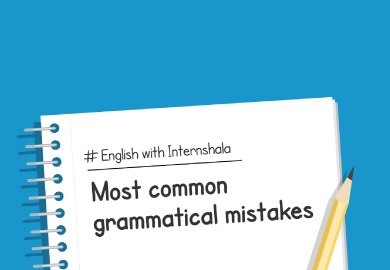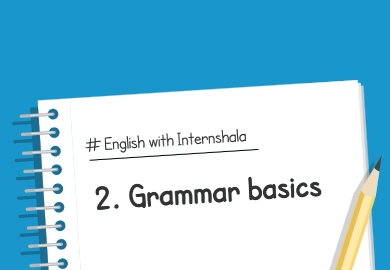How to build your vocabulary efficiently
Now that you have learned the basics of English grammar, it’s time for using that knowledge in writing applications, writing answers while applying for internships etc. However, you are stuck while writing, frustrated about the lack of the right word in your lexicon. That’s why, in this article of English with Internshala series, we’ll focus on different ways of building one’s vocabulary efficiently. Building your vocabulary has many advantages beyond improving your writing. A rich, well-developed vocabulary will help you perform better in group discussion rounds, boost your confidence in interviews, and develop your overall personality.
If you are wondering how you can start learning new words, worry you not; we have you covered. Here are a few fun and exciting ways through which you can boost your command of words:
1. Read, read, and read: Reading is undoubtedly the best way to build one’s vocabulary. Read beyond your textbooks; read for pleasure. The more you read – from novels and literary works to magazines and newspapers- the more words you’ll be exposed to. As you read and uncover new words, try to guess their meaning from the context of the sentence and then look up the definition in a dictionary.
2. Make your own flashcards: There are a plethora of flash cards and word lists available online with definitions of the words and words grouped according to spelling/meaning; however, nothing guarantees the prospect of learning a word for a long period of time than creating your own flash cards. And you don’t even need to face the hassles of creating a physical wordlist; you can do everything online. Cram.com is one of the best platforms for this. You can even download their app, and have your own wordlists on the go. Your flashcards can include the meaning, pronunciation, antonyms and synonyms, roots etc.
3. Knowing the roots and using associations: The best way to learn meanings and definitions is to make associations; our brain responds better when it detects an association. The associations can be pictorial – associating words with pictures is a very helpful tactic and can be used on sites like Pictionary.com, or even through YouTube videos. The second, more traditional way of making associations is learning the roots of the words. Most words in the English language have Latin or Greek roots, and Word Power Made Easy by Norman Lewis is the best tool for learning these roots.
Example:
The greek root word ‘Phil‘ which means ‘love for something‘. Once you understand this root, you can easily guess the meanings of words like philanthropist (one who loves humanity), bibliophile (one who loves books), philology (love for words) etc.
4. Play different games and quizzes: It’s a psychological fact that a human brain ceases active learning when the process becomes too repetitive and boring. The more you challenge your mind, the better prospects you have of retaining things. Many games and quizzes are available online which aim to make learning more comfortable and interesting. One good resource is vocabulary.com which uses psychological algorithms for retaining a better memory, all the while making it extremely entertaining with all the reward points and top charts. You can even challenge your friends or fellow test takers. You can also play games like the anagram, crossword puzzles, scrabble etc. on sites like wordsplay.com
5. Learn a new word every day: Many tools are available online that can help you to learn a new word every day. Web sites (and apps) like Dictionary.com provide a new word every day with its meaning, usage example, pronunciation, origin etc.
 6. Use the words in your day-to-day conversations: Once you’ve learnt a new word, start using it in your daily conversations. Use them while talking to your friends, during classroom discussions, and even practice saying them in front of a mirror.
6. Use the words in your day-to-day conversations: Once you’ve learnt a new word, start using it in your daily conversations. Use them while talking to your friends, during classroom discussions, and even practice saying them in front of a mirror.
Learning new words might seem like a horrendous task at first, but as you go ahead with your preparation, you will come to appreciate the beauty of it. Not to forget, enhanced vocabulary stays with you for the better part of your life.
It’s time to check your vocabulary now; take this interesting assignment by clicking on the next button below. To go back to the earlier article, click on the previous button.





